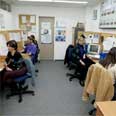
There are three mitzvoth that are unique to women in Judaism: Nerot (lighting candles), challah (separating a portion of dough), and niddah (immersion in a ritual bath or mikvah after the end of the menstrual period).
The last mitzvah is the most problematic one – as much as it is intimate and personal, it has always been under the supervision of men.
Throughout the generations, when women encountered a problem pertaining to niddah, they could only turn to one person – their rabbi. As a result, many women would refrain from asking questions, because no matter how nice their rabbi was, talking to him about their menstruation was too awkward.
And so, women would often practice the mitzvah too strictly, or alternately give up on the attempt to uphold the mitzvah altogether.
The Nishmat Center for Advanced Jewish Studies for Women in Jerusalem, founded by Rabbi Yehuda Henkin and his wife, Rabbanit Chana Henkin, created a program meant to train women to become Yoatzot Halacha (halachic consultants) and provide counsel on women's halachic issues.
Cooperation with rabbis
The two-year program, called Keren Ariel, includes in-depth Jewish studies, as well as courses in psychology, physiology, sexual practices and bridal instruction. Only married, Orthodox women are admitted to the program.
For a number of years now Nishmat has been operating a hotline staffed by its consultants, and a complementary website was launched a year ago.
The graduates staff the centers' hotline and website, answering questions from across the world. Women are invited to contact the consultants on any question relating to purification practices.
The consultants work in cooperation with a team of rabbis and are authorized to provide halachic answers. When a precedential issue arises, it is referred to one of the rabbis to rule on.
The benefit of personal experience
"Women of all ages call," said Rachel Shprechner, one of the consultants. "Starting from newly-weds two days after their wedding, who are not sure what their halachic status is, to middle aged women.
"Our advantage over men is that we know these things from personal experience."
Shprechner said that halachic concerns can lead to frustration and anger among women who don't know who to turn to for counsel. "More than once, we received calls from women who haven't been with their husband for months because they had no one they could ask what to do about something.
"We are able to understand a woman's special condition, speak to her openly and instruct her on how she should act in the future. With a rabbi she would have had a brief, laconic conversation."
According to Shprechner, the consultants have established good relations with the rabbinical establishment, thanks to their willingness to engage in constant dialogue with rabbis. "This has been revolutionary, and I believe that such projects should be expanded, because there is great need for them," she concluded.
Nishmat's Women's Halachic Hotline: 02-6404343
Website: www.yoatzot.org















